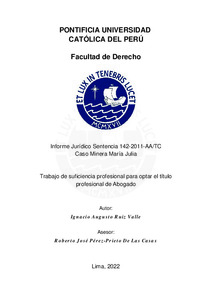Informe Jurídico Sentencia 142-2011-AA/TC Caso Minera María Julia
Abstract
El presente Informe Jurídico versa en torno a una de las sentencias más relevantes emitidas
por el Tribunal Constitucional peruano: la sentencia 142-2011-AA/TC, también conocida
como el caso Minera María Julia. La sentencia estableció los tres únicos posibles casos de
procedencia del amparo contra laudo arbitral, definiendo que, para los demás casos, el
medio idóneo era el recurso de anulación de laudo. El presente informe analiza lo
establecido por el Tribunal Constitucional considerando la naturaleza tanto del recurso de
anulación de laudo como de la acción de amparo arbitral.
Para ello, se realiza un análisis del recurso de anulación de laudo, observando si se trata de
un recurso o de un proceso autónomo. De igual manera, se analiza cuánta capacidad real
tiene el recurso de anulación de laudo para proteger derechos fundamentales en reemplazo
de la acción de amparo. Posteriormente, se revisa la naturaleza de la acción de amparo,
determinando la necesidad de mantener su carácter de urgencia y de proceso residual.
Finalmente, se observa el conflicto que surge al querer determinar cómo armonizar el
correcto uso del recurso de anulación de laudo con la necesidad de mantener al proceso de
amparo como una vía residual, concluyéndose que debe añadirse un criterio adicional. This Legal Report deals with one of the most relevant judgments issued by the Peruvian
Constitutional Court: Judgment 142-2011-AA/TC, also known as the Minera María Julia
case. The judgment established the only three possible cases in which an amparo action
against an arbitration award could be granted, defining that, for the other cases, the
appropriate remedy was the appeal for annulment of the award. This report analyzes the
Constitutional Court's ruling, considering the nature of both the appeal for annulment of the
award and the amparo action.
To this end, an analysis is made of the appeal for annulment of the award, noting whether it
is an appeal/recourse or an autonomous process. Likewise, an analysis is made of the real
capacity of the appeal for annulment of the award to protect fundamental rights in
replacement of the amparo action. Subsequently, the nature of the amparo action is
reviewed, determining the need to maintain its character of urgency and residual process.
Finally, the conflict that arises when trying to determine how to harmonize the correct use of
the appeal for annulment of the award with the need to maintain the amparo process as a
residual remedy is observed, concluding that an additional criterion must be added.
Temas
Derechos fundamentales--Perú
Derecho constitucional--Jurisprudencia--Perú
Arbitraje y laudo--Jurisprudencia--Perú
Derecho constitucional--Jurisprudencia--Perú
Arbitraje y laudo--Jurisprudencia--Perú
Para optar el título de
Abogado
Collections
The following license files are associated with this item:






